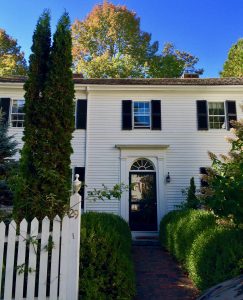 The American poet Richard Wilbur died last October at the age of 96. He’d served as Poet Laureate and, over the decades, had had all the usual literary treasures strewn at his feet, including the National Book Award and two Pulitzer Prizes. But he was never as well known as his teacher and mentor Robert Frost or his contemporaries Robert Lowell and Sylvia Plath. He was a formalist in the age of the Beats and free verse; restrained and subtle during the heyday of the “confessional” poets. Along with his own eleven collections of poetry, he was a prize-winning translator and essayist.
The American poet Richard Wilbur died last October at the age of 96. He’d served as Poet Laureate and, over the decades, had had all the usual literary treasures strewn at his feet, including the National Book Award and two Pulitzer Prizes. But he was never as well known as his teacher and mentor Robert Frost or his contemporaries Robert Lowell and Sylvia Plath. He was a formalist in the age of the Beats and free verse; restrained and subtle during the heyday of the “confessional” poets. Along with his own eleven collections of poetry, he was a prize-winning translator and essayist.
I met him twice, perhaps forty years apart, initially, when I was still a student, at a writing conference at the University of Virginia where he gave a talk on how Frost’s ‘Stopping by Woods’ could be read as a longing to commit suicide. At that time, in the early 1970s, it was considered a radical interpretation. Then, a few years ago, I helped to organize an event in his honor in New York City. He was in his early nineties by then, but still tall, bluff, and imposing, with a Yankee’s dry wit and courteous manner. I sat next to him at a luncheon and made a fool of myself by reciting lines from one of his poems. But he told me there was no greater compliment in the world than to have one’s words remembered by heart.
He lived not far from us, in Cummington, Massachusetts. His poems, like Frost’s, are imbued with a love of nature. And though he did so with formality and discretion, he also wrote about the full range of human love — for his friends, children, and perhaps especially for his wife Charlee to whom he was married for 65 years. She died in 2007. Here’s a poem he wrote a few years after her death.
The House
By Richard Wilbur
Sometimes, on waking, she would close her eyes
For a last look at that white house she knew
In sleep alone, and held no title to,
And had not entered yet, for all her sighs.
What did she tell me of that house of hers?
White gatepost; terrace; fanlight of the door;
A widow’s walk above the bouldered shore;
Salt winds that ruffle the surrounding firs.
Is she now there, wherever there may be?
Only a foolish man would hope to find
That haven fashioned by her dreaming mind.
Night after night, my love, I put to sea.
Though the house in the poem is imaginary, the one in the photo above bears a resemblance. It was the home of Wilbur’s fellow poet Robert Lowell and his wife Elizabeth Hardwick in Castine, on the coast of Maine.



I so enjoyed this! That beautiful white house off the coast of Maine calls to me. I live in central eastern Maine.
I had never read this poem of Richard Wilbur till now. Outstanding!
Have you been to Castine, Cheryl? It’s become one of my favorite places in the world.
Oh to be Charlee and have someone who can write such a poem out to sea trying to get to me!
Yes! I think some of his most beautiful poems were written to her — or about her.
A beautiful post, and poem. Thank you!
Thank you, Phyllis!
I so envy your meetings with the poet! I was drawn to one of his poems in the New Yorker over 55 years ago that I kept in my wallet for years. (I invested in a printed volume years later.). I believe it is Ballade for the Duke of Orleon. It’s one of the few poems I have set to memory. It ends: Duke, keep your coin. All men are born distraught. Whether we live in fact or but in thought, we die of thirst, here at the fountain side. Je Meure de soif auprez de la Fontaine is the line to be incorporated into a poem with a prize being offered by the Duke. I loved the poet’s translations of Moliere, as well. So witty, elegant and droll.
I’m delighted to meet a Wilbur aficionado! He’s translations are wonderful — including the delightful Candide. I feel lucky to have met him. In person he was witty, elegant and droll, as well.
Liza,
A really beautiful poem and a beautiful post, as Phyllis Azar wrote.
Are you ever holding any workshops? I am trying to return to my unfinished book of poems about living on my farm with its impossibly westward view of rolling hills, Catskills, sky,
I’d love some help.
Amy White
So good to hear from you, Amy. I’m glad to hear you’ve gone back to your work, but I’m afraid I’m not holding any workshops. However, I might be helping to organize a poetry reading in West Stockbridge and will send you more information if it comes together. All my best until then! Liza